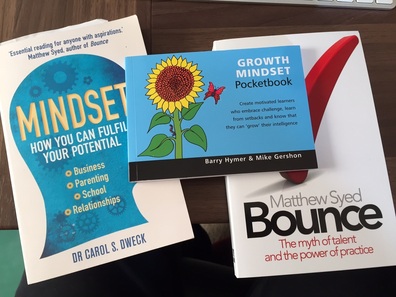|
Following on from my previous blog post I thought I would talk about something else that was an integral part of my teaching in 2014. And this really was something that I just stumbled upon while doing my research into motivation during the first term. And this is growth mindset. Growth Mindset Motivating pupils to be willingly interested during lessons is one of the most significant aspects of mathematics teaching. It is a critical feature of the Department for Educations Teaching Standards; successful and effective teachers should be able to differentiate and motivate the less attentive students as well as those who are highly motivated. One of the biggest influences on motivation within the classroom is the concept of growth mindset, Carol Dweck (2012) in her book Mindset said ‘A simple idea that makes all the difference. Teaching a growth mindset creates motivation and productivity in the worlds of education.’ Dweck describes growth mindset as a form of self-esteem, and having the courage and determination to address weaknesses. This is reinforced by John Hattie (2011), who proposes that teachers would have greater success if they addressed student’s low self-efficacy before trying to increase achievement. Dweck works with how to implement this by promoting a growth mindset in the classroom. This looks at the core internal processes that drive students to achieve and will play a crucial role in my research. Matthew Syed (2011) said: ‘Where motivation is internalised, children tend to regard practice not as gruelling but as fun’. In terms of using this in the classroom, some of the key ideas which I focussed on was the use of language, and in particular praising the process behind the work. Helping the pupils to internalise the process and become more reflective as a result. Using praise in the lesson such as: “What process did you use with this task?” “I like the way you’ve thought about this task” “Could you think about this question in a different way?” “The way you’ve approached this is excellent but now think about this…” “I think that you are ready to teach this to a small group in the class now… how might you teach this?” The use of this in the classroom undoubtedly had an incredibly positive impact, especially upon particular students who would be considered by Dweck to be within a 'fixed mindset'. This is something I will be pursuing long term throughout my practice and has sparked a real interest into the potential of growth mindset within the classroom. I'd be really interested to hear some ideas from people as to how they have incorporated growth mindset strategies in their lessons! You can purchase all of these books on amazon: Dr Carol S. Dweck - Minset (Click to follow the link) Matthew Syed - Bounce (Click to follow the link) Barry Hymer & Mike Gershon - Growth Mindset Pocketbook Here is a really interesting talk on TED by Dr Steve Peters around his book 'The Chimp Paradox' looking at the human mind. Dr Steve Peters is a Consultant Psychiatrist working full time in Elite Sport. His career began with teaching Mathematics and then moved on to Medicine. His specialist interest is in the working of the human mind and how it can reach optimum performance applied to all walks of life. Here is a link to his book:
Prof Steve Peters - The Chimp Paradox (Click to follow the link) Bibliography 1] Dr Carol S. Dweck (2012). Mindset, How You Can Fulfill Your Potential. London: Robinson. 213. 2] John Hattie (2011). Visible Learning for Teachers: Maximizing Impact on Learning. USA: Routledge. P234-250. 3] Matthew Syed (2011). Bounce. London: Fourth Estate. 59. 4] Barry Hymer & Mike Gershon (2014). Growth Mindset Pocketbook. Hampshire: Teachhers' Pocketbooks. 62-125. 5] Prof Steve Peters (2012). The Chimp Paradox, The mind management programme for confidence, success and happiness. Vermillion 6] Video: Accessed at https://www.youtube.com/watch?v=R-KI1D5NPJs
0 Comments
Leave a Reply. |
Search for a topic
Categories
All
Archives
May 2018
|
|
Maths Resources @AccessMaths
|
©AccessMaths 2015
|


 RSS Feed
RSS Feed